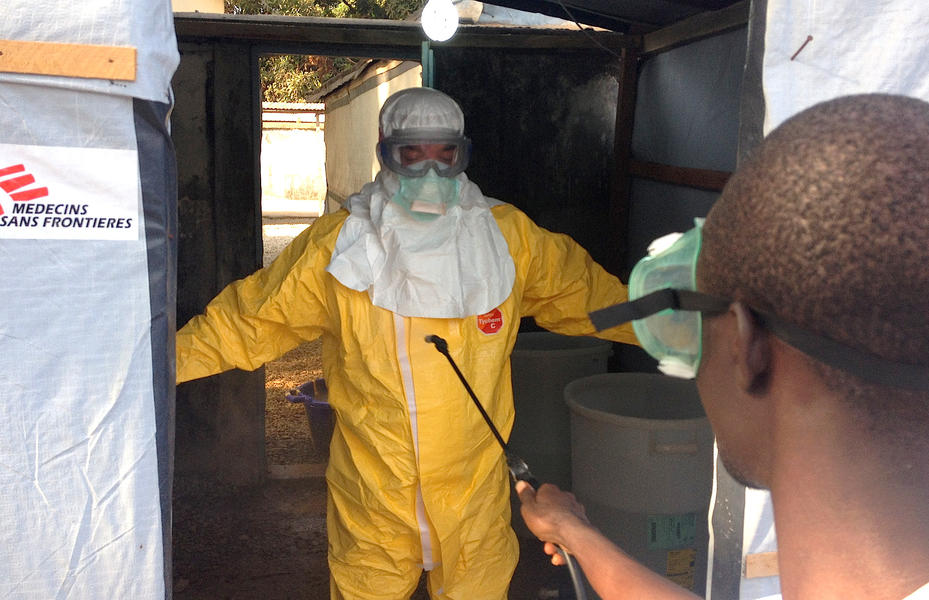The Ebola outbreak apparently started with a 2-year-old in rural Guinea


A free daily email with the biggest news stories of the day – and the best features from TheWeek.com
You are now subscribed
Your newsletter sign-up was successful
The world's biggest and deadliest Ebola outbreak began with a 2-year-old boy in a village in Guéckédou, Guinea — near the West African country's borders with Sierra Leone and Liberia — a team of researchers reports in The New England Journal of Medicine. The boy died of unidentified causes on Dec. 6, followed a week later by his mother, then 3-year-old sister, then grandmother. Mourners at the grandmother's funeral brought the virus to other villages.
The early victims had symptoms of Ebola, but the outbreak is in a part of Africa with no history of the disease, so health workers weren't trained to spot or treat the disease. And because it's a heavily trafficked region, the disease has been very difficult to track down and isolate.
Doctors Without Borders helped identify and treat the outbreak in March, and health officials thought they had it contained by April. The outbreak flared up a month later, worse than ever — there are now officially 1,779 cases, including 961 deaths, but health authorities believe there are more cases. The World Health Organization has declared an international health emergency.
The Week
Escape your echo chamber. Get the facts behind the news, plus analysis from multiple perspectives.

Sign up for The Week's Free Newsletters
From our morning news briefing to a weekly Good News Newsletter, get the best of The Week delivered directly to your inbox.
From our morning news briefing to a weekly Good News Newsletter, get the best of The Week delivered directly to your inbox.
So how did the 2-year-old get the virus? "We suppose that the first case was infected following contact with bats," Sylvain Baize at France's Pasteur Institute, and one of the researchers studying the outbreak, tells The New York Times. "Maybe, but we are not sure." The blood of fruit bats, as well as monkeys and apes, can infect people, but some researchers think that fruit with bat guano on it can also spread the virus to humans.
A free daily email with the biggest news stories of the day – and the best features from TheWeek.com
Peter has worked as a news and culture writer and editor at The Week since the site's launch in 2008. He covers politics, world affairs, religion and cultural currents. His journalism career began as a copy editor at a financial newswire and has included editorial positions at The New York Times Magazine, Facts on File, and Oregon State University.
-
 6 of the world’s most accessible destinations
6 of the world’s most accessible destinationsThe Week Recommends Experience all of Berlin, Singapore and Sydney
-
 How the FCC’s ‘equal time’ rule works
How the FCC’s ‘equal time’ rule worksIn the Spotlight The law is at the heart of the Colbert-CBS conflict
-
 What is the endgame in the DHS shutdown?
What is the endgame in the DHS shutdown?Today’s Big Question Democrats want to rein in ICE’s immigration crackdown
-
 Trump HHS slashes advised child vaccinations
Trump HHS slashes advised child vaccinationsSpeed Read In a widely condemned move, the CDC will now recommend that children get vaccinated against 11 communicable diseases, not 17
-
 FDA OKs generic abortion pill, riling the right
FDA OKs generic abortion pill, riling the rightSpeed Read The drug in question is a generic version of mifepristone, used to carry out two-thirds of US abortions
-
 RFK Jr. vaccine panel advises restricting MMRV shot
RFK Jr. vaccine panel advises restricting MMRV shotSpeed Read The committee voted to restrict access to a childhood vaccine against chickenpox
-
 Texas declares end to measles outbreak
Texas declares end to measles outbreakSpeed Read The vaccine-preventable disease is still spreading in neighboring states, Mexico and Canada
-
 RFK Jr. shuts down mRNA vaccine funding at agency
RFK Jr. shuts down mRNA vaccine funding at agencySpeed Read The decision canceled or modified 22 projects, primarily for work on vaccines and therapeutics for respiratory viruses
-
 Measles cases surge to 33-year high
Measles cases surge to 33-year highSpeed Read The infection was declared eliminated from the US in 2000 but has seen a resurgence amid vaccine hesitancy
-
 Kennedy's vaccine panel signals skepticism, change
Kennedy's vaccine panel signals skepticism, changeSpeed Read RFK Jr.'s new vaccine advisory board intends to make changes to the decades-old US immunization system
-
 Kennedy ousts entire CDC vaccine advisory panel
Kennedy ousts entire CDC vaccine advisory panelspeed read Health Secretary RFK Jr. is a longtime anti-vaccine activist who has criticized the panel of experts
